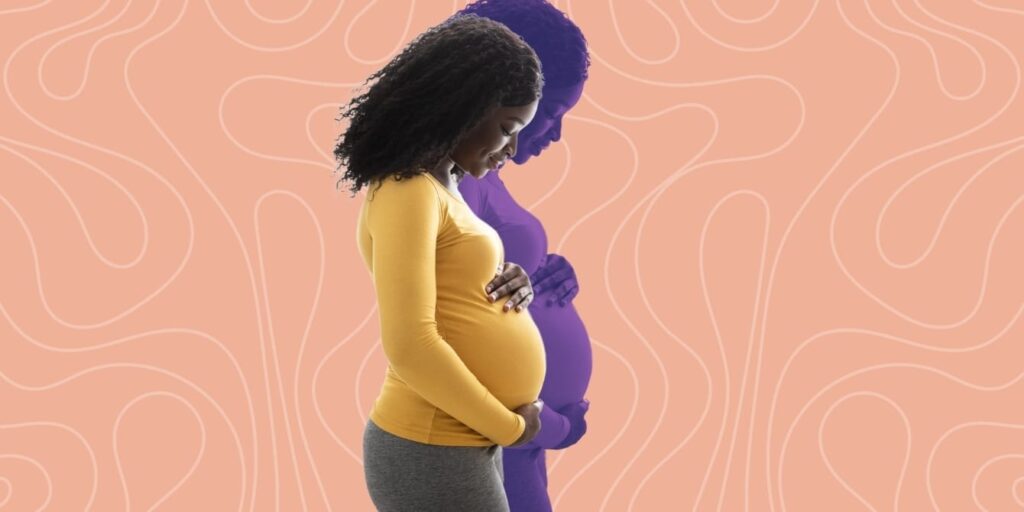[ad_1]
If you’ve been paying attention to the maternal health crisis in the U.S., you’ve probably heard this horrifying statistic before: Black women in the U.S. are three times more likely to die from pregnancy-related causes than white women.
While the maternal mortality crisis has (finally) been getting more attention, one of the big pushes lately is telling Black moms to speak up. The idea? Advocacy can save lives. The Washington Post recently reported on the move to help Black moms advocate loudly for themselves before, during, and after childbirth. But here’s the thing: it’s a step—not the full solution.
What’s happening right now
Programs nationwide are teaching Black mothers to be their own advocates in delivery rooms. Nurses and doulas are coaching women to “speak up” if something doesn’t feel right. The Post describes one case in point:
Ariel Freeman, a Black mom in Brooklyn, was hemorrhaging after childbirth but had to repeatedly demand help before she got the emergency care that saved her life. Her pregnancy coach, a nurse in a first-time moms program, drilled the mantra: “They won’t listen, so you speak up.”
It isn’t just theory in a prenatal class—Black mothers like Ariel are living it. Freeman credits her survival to her persistence. But should women really have to fight for their lives while delivering their babies or recovering from childbirth?
The problem isn’t about asking for help. It’s about systems that aren’t built to listen to or respect Black women. Racism—both in healthcare and in the broader environment—takes a toll. Poverty, stress, financial struggles, and being dismissed by healthcare providers create conditions that actively harm maternal health. The issue is not simply about wealth or status. Even Serena Williams, one of the wealthiest and most visible women on the planet, had to demand care when she experienced life-threatening complications after childbirth. If it happened to Serena Williams, what would happen to Black moms with less structural power?
Related: Giving birth shouldn’t be a death sentence, but for Black moms, this is the reality
Why “speak up” isn’t enough
Telling Black moms to advocate for themselves is powerful and critical. It also puts the burden of survival on the people who are already the most vulnerable. It’s asking them to fight a system at their weakest moments. Advocacy is great, but it shouldn’t be the end. Moms deserve healthcare systems that work for them, not against them.
What needs to change for Black moms
We need to go beyond telling Black women to advocate and start fixing the systems that make advocacy necessary. Here’s what that could look like:
- Better training for healthcare providers: Anti-racism birth training for nurses, midwives, and doctors should be standard, not optional, like it is today.
- Accessible care: Programs that provide free doulas to speak on behalf of moms during birth (available in states like New York and Texas) can be lifesaving. Let’s make them universal.
- Policy-level support: Paid leave, postpartum care, safe, affordable childcare, and ongoing support for families aren’t luxuries—they’re essentials for keeping moms alive and thriving. For example, introducing comprehensive federal policies like universal paid family leave and guaranteed access to culturally competent doulas and midwives could directly address disparities in maternal care. State-level programs are a start, but nationwide solutions—rooted in equity—are essential for meaningful change.
- A cultural shift: Respecting Black mothers means addressing the broader maternal mortality crisis with urgency.
While advocacy is an essential tool, it’s not a solution. Moms shouldn’t have to scream to be heard—they should be listened to from the start. It’s time to step up for Black moms, not ask them to shoulder the weight alone.
Related: Black moms are dying in childbirth. Why aren’t we talking about the reasons behind this crisis?
Sources:
- Respectful Care eModules. The American College of Obstetricians and Gynecologists. Respectful Care eModules.
[ad_2]
Source link

